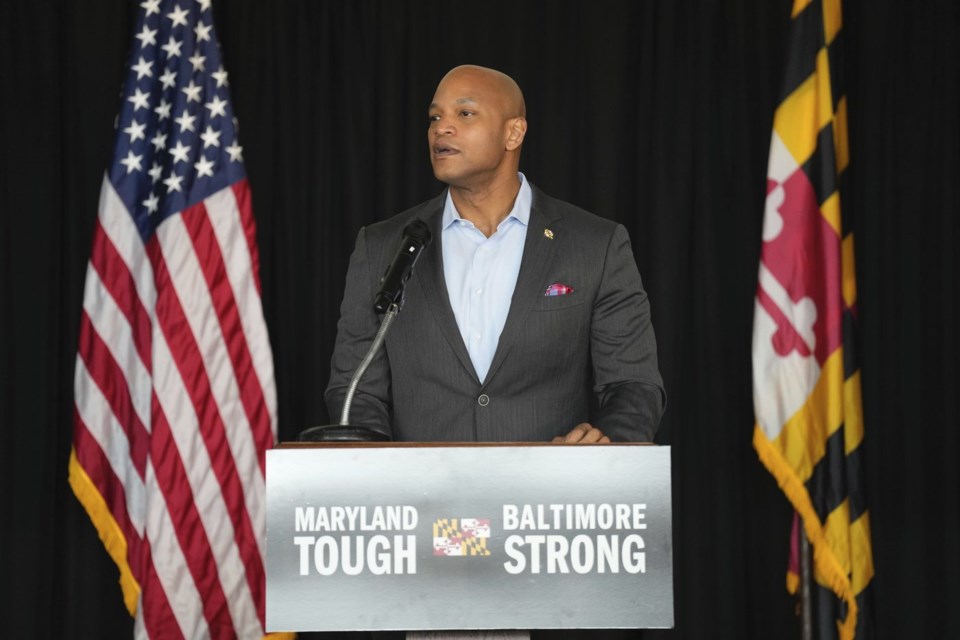ANNAPOLIS, Md. (AP) — Maryland Gov. Wes Moore, facing budget problems and President Donald Trump’s dramatic efforts to downsize a federal workforce crucial to Maryland's economy, said the state must become less reliant on federal jobs and better develop other economic strengths, during a speech to state lawmakers Wednesday.
Moore, a Democrat mentioned as a rising star in the party and a potential future presidential candidate, described both the state's $3 billion budget deficit and the new administration's first actions as “two storms” that have made landfall.
“We are being tested by an historic fiscal challenge — the likes that we haven’t seen since the Great Recession — and if that wasn’t enough, we are now being tested by a new administration in Washington that sows uncertainty and confusion, and chaos,” Moore said.
The Republican president's first weeks back in office have jolted heavily Democratic Maryland by decreeing a federal hiring freeze and proposing a widespread buyout plan that encourages federal workers to quit. There also were confusing executive orders, including one that abruptly froze and then unfroze federal grant funds, as well as other broad changes to the federal government sending shockwaves into a state that neighbors the nation's capital.
“These ideological moves will have the distinct impact on hurting our middle class, which is already feeling the pinch of inflation,” Moore said. “And in a larger sense, and heartbreakingly, these actions mark a shift in a longstanding relationship and longstanding norms between Washington and Maryland — norms that have been preserved by leaders of both political parties and of all backgrounds.”
Moore, who was mentioned as a possible replacement for then-President Joe Biden last year when he withdrew his reelection bid, said he still hopes to work with the new administration and Republican-led Congress to “deepen the partnership between Maryland and Washington, D.C., that has benefited our people all across the country for generations and across political ideologies.”
“But if the policy decisions of these past few weeks are any preview, I fear that our most charitable expectations will be met with harsh realities — that at a time when our nation needs clarity, we confront chaos," the governor said.
“At a time when our nation needs vision, we confront hysteria," Moore added.
Maryland, Virginia and the District of Columbia have about 20% of the nation’s federal workers. Federal employees represent about 5.7% of Maryland's total employment, compared to 1.9% nationally, according to a 2024 report by Maryland Comptroller Brooke Lierman's office.
The federal government also supports an ecosystem of private sector suppliers, contractors, and subcontractors in Maryland. Federal procurement provided a $42 billion investment in Maryland businesses in 2022, which represented 10% of the state’s GDP, the report says.
The governor said he has identified “three lighthouse industries of the future” that he wants to focus on in Maryland, including life sciences, information technology and aerospace and defense.
The governor said the state must close its budget gap in a way that grows the middle class, “supercharges and diversifies our economy” and “breaks our distinct reliance on Washington.”
Maryland Republicans said the state is underachieving, but not for the reasons mentioned by the governor.
“Maryland families are struggling with their finances, energy costs, higher prices and more because of the expensive policies and overregulation passed by a Democratic Supermajority — not because of his predecessor or new leadership in Washington,” said state Sen. Steve Hershey, the Maryland Senate minority leader.
Moore has proposed a budget for the next fiscal year that includes higher income tax rates for taxpayers who make $500,000 or more, as well as about $2 billion in spending reductions throughout state government to address a $3 billion deficit. The proposal would create a new 6.25% tax rate for people who make more than $500,000 and a 6.5% rate for taxpayers who make more than $1 million.
For incomes over $350,000, an additional 1% tax would be levied on profits from the sale of stocks and other assets. The governor says 82% of Marylanders will either see a tax cut or no change. He's also proposing a reduction to the state's corporate tax rate.
Brian Witte, The Associated Press



